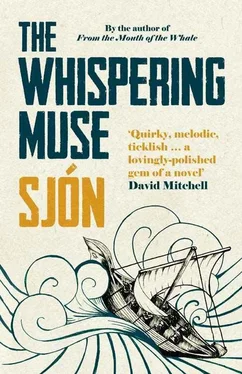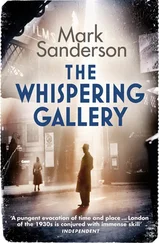The purser’s lady friend, who seemed to have an absolute monopoly over the serving of alcoholic beverages, was now in the best of spirits and I could see no sign that she harboured a grudge against me. She served us liberally, filling her neighbours’ glasses and asking the diners please not to be shy about helping each other to wine. In fact, as it turned out, everyone had rather more than they wished for. What reason she had to play both host and hostess that evening and offer the drink so freely I cannot say, though I have a hunch that as ever the couple’s addiction to profit was to the fore, since I had gathered from Captain Alfredson that my hospitality bill, like those of the officers, would be paid by the shipping company, however high. So the couple would profit from any refreshments we consumed over and above what was considered a normal part of the meals, and alcohol weighed heavily in the balance. I tried to raise the matter with Alfredson but the woman saw and forestalled me by rising from her seat and inviting the guests to drink a toast to the captain, which we did with a good will.
Pleased as punch, Alfredson hurried to his quarters and returned with a stack of records and a gramophone. Seeing this, the first mate grabbed the corners of the tablecloth, one after another, and whipped it off the table complete with all the dishes and the remains of the rum trifle. He swung it over his shoulder like a sailor’s kitbag, swept into the galley and flung it in the corner with a resounding crash and clatter of breaking crockery. I saw the purser’s lady friend laugh out loud at this, for the purser could also charge the shipping line for loss of tableware. The captain slammed the gramophone down on the table and the second engineer was set to winding it up and choosing the music; drinking songs, as it turned out — tales of womanising and debauchery in thirteen languages.
The instant the needle touched the groove in the record the purser’s lady friend became the focus of the party. Everyone had to dance with her in turn: the captain, the first engineer, first mate, cook, steward and the three deckhands who were off duty — it was Caeneus’s watch — while I myself filled in for the second engineer and twirled the gramophone crank while he twirled the woman.
From where I sat, squeezed up against the phonograph, I couldn’t block my ears to song after song describing the sailor’s life. The most memorable for me was a comic number listing all the scrapes that drinkers can get into:
I went to Australia and there I was happy:
I bought dozens of girls for a month at a time.
I went down to Italy and there I was happy:
I poleaxed the barmen who didn’t serve me on time.
I went to Rhodesia and there I was happy:
I knocked down wry-faced old blackamores with my fists of steel.
I went to Colombia and there I was happy:
I took married women to my bed and enjoyed them for a while.
(Retold in my own words, V. H.)
The chorus went as follows:
I ended up in hell and here I am happy.
And I have this to say to anyone who’s curious about my lot:
I feel no compunction for what I have done.
I have no interest in the dishonoured –
No interest in the dead.
(Retold in my own words, V. H.)
Why should this particular song have been etched in my memory so that I can record its contents here? Well, because during the last verse the purser’s lady friend came dancing up to me with one of the Kronos line’s fine linen napkins in her hand. She had folded the napkin into a Napoleon hat. As the woman bent forward to place the hat on my head, my senses were filled with a powerful odour of mingled gin, cigarettes, eau de cologne, hair lacquer and sweat — before she straightened up and screeched:
‘ Du bist doch mein süßer Papageientaucher …’
I laughed at this along with the rest while thinking to myself that Dr Pázmány would have been able to read a thing or two from the woman’s behaviour, especially when she called me ‘her puffin’.
Be that as it may, when the carousing was at its height and the music had begun to pierce one’s ears like the song of the sirens, I heard someone shouting above the din of the gramophone:
‘Hey, hey there! I… you! Listen, hey, listen! Hey, you!’
The purser was standing apart from the milling throng, snatching at his shipmates, one after the other, in an attempt to buttonhole them. He was one of those whom Bacchus renders eloquent, and had imbibed just the right dose of spirits to fine-tune his speech organ to the point where his inability to pronounce his ‘r’s had largely disappeared. This emboldened him to make pronouncements, and he began imparting loudly into my right ear everything that he had on his chest — I was his sole audience and confidant once his shipmates on the dance floor had shaken him off — and unfortunately it has to be said that it was pretty poor, thin stuff, though it contained the odd interesting titbit.
Including the news that he had purchased his lady friend for the price of a leg of pork:
THE PURSER’S TALE
There is a type of venomous snake known as Vipera ursini . It is about a foot and a half long, ash-grey with brown spots and prominent black markings that zigzag the length of its spine. This snake lives in the undergrowth on the forest floor, devouring small animals, both hot- and cold-blooded, though it will sometimes undertake long forays into areas inhabited by man. Here it suddenly appears, having slithered under tree roots, down streams, along tracks and across the borders of the wood, all the way to the dark green thicket of willow that stands on the eastern edge of the old garden on the Polish estate of TZ—, posing as a compromise between cultivated land and untouched nature.
In late summer these willow shrubs provide the shadiest place in the garden and the gouvernante was in the habit of taking her little charges there to amuse themselves; the gouvernante being the governess who looked after the grandchildren of the elderly aristocrat and former magistrate, TZ—. He was a widower and usually lived alone apart from his servants, but because of the war, his daughter-in-law and her three children had come to stay with him while their father was away directing the defence of the homeland. One day, following afternoon tea, the gouvernante appeared in the shade of the shrubbery with the baby Opheltes, the long-awaited son, in her arms. She led the younger girl by the hand while the elder ran off at a tangent with her butterfly net aloft, trying to capture the mayflies that glowed bewildered in the sunshine.
The gouvernante had no sooner reached the thicket of rough willow shrub than out of it stepped seven heavily armed men. They were equipped for a secret mission, in black overalls and lace-up leather boots, with provisions in knapsacks and their faces painted camouflage green. The woman didn’t spot them until they parted the leafy branches and materialised before her. Upon which she gave a scream of terror and was about to flee with the children when the leader of the gang spoke:
‘You see before you friends of the fatherland; we mean you no harm.’
He raised his hands and showed her that they were empty. And the woman thought to herself, those are the hands of an artisan — they offer me no threat. The others also raised their hands. And their leader continued:
‘All we want is something to drink, then we’ll be on our way: our business is with the Germans at the fortress of Thebes.’
She answered:
‘I can give you water. Come with me to the house where you’ll be given both food and drink…’
‘Thank you, good woman, but our mission is secret and we cannot afford to lose any time. So we’ll continue on our way.’
Читать дальше












